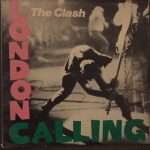London calling
Steve Lamacq’s Radio 6 programme this week has featured music people played when they were fourteen years old; for Steve Lamacq himself, this has meant music from 1979. Having reached my nineteenth birthday late that year, Steve Lamacq’s selection was familiar. He celebrated his fifteenth birthday on 16th October 1979 and as he played a medley of records memories returned of that week thirty-seven years ago.
The first two weeks of term had passed, serious lectures had been attended, a routine should have been established, but becoming distracted was too easy for a country boy living in London for the first time. A sensory overload means even assembling the images from the time in some sort of order is difficult.
Paddington station comes back as splashes of yellow and blue, the Inter-City 125 locomotive of British Rail’s Western Region that brought the train from Taunton. The tube station at The Angel still depended on great caged lifts to bring passengers to and from the platforms. The walk to Rosebery Avenue crossed major roads still uncrowded with traffic.
Knowing which place was which was confusing, the hall of residence was in Clerkenwell but the town hall was Islington, the market was neither, but was called Exmouth. A permanent market, it was very different from markets in Somerset which appeared once a week. The stallholders seemed characters from a story book.
There was a pie and mash shop in the street, traditional delicacies like jellied eels being among its fare. Food was never a concern, though, the £350 cost of staying in the hall of residence included breakfast and evening meals, and on a grant of £700 a term from Somerset County Council there was plenty to eat and cash to spare.
The walk to the LSE was half an hour of extraordinary contrasts. Streets of 1970s drabness were followed by the beauty of Lincoln’s Inn Fields. The School’s buildings were a random amalgam clustered around Houghton Street, the place had the air of a worn pair of shoes, faded, but comfortable. The corridors were filled with a constant political ferment; neo-liberalism had triumphed in the May general election; the Left was in disarray, reformists and revolutionaries argued about the future.
To someone whose previous visits to London could have been numbered on the fingers of one hand, everything was novel, sometimes intimidating. The most magical moments were at the Aldwych Theatre, then the home of the Royal Shakespeare Company; a front stalls ticket normally costing £6.60 was £1.10 for students on a Monday night. The worst moments were discos where a wrongly dressed rustic felt uncomfortably lost.
All of it was against a background of constant music, everywhere there was music. The punk movement had evolved into New Wave, there was a seriousness in lyrics, an unrest in songs. The Jam’s “Eton Rifles” was an anthem of anti-establishment protest and that month The Clash released “London Calling,”it was the album that captured the mood of the times
Steve Lamacq talked this evening with members of The Clash about the writing of the songs, the events that had influenced their thoughts, the disquiet they had expressed, the legacy their recordings had left. Had he celebrated his nineteenth birthday on 16th October 1979 instead of his fifteenth birthday, he might still be haunted by the title track of that album.



Comments
London calling — No Comments
HTML tags allowed in your comment: <a href="" title=""> <abbr title=""> <acronym title=""> <b> <blockquote cite=""> <cite> <code> <del datetime=""> <em> <i> <q cite=""> <s> <strike> <strong>